Mommy's Going to Treatment - What to Say to the Kids

Mommy's Going to Treatment
What to Say to the Kids
The effects of a parent's addiction on a child can be devastating and going to treatment can be the best gift a parent can give their kids.
Knowing how to talk to your kids about your addiction and going to treatment can be as tricky as trying to figure out what to tell your kids about the birds and the bees. Both situations require age-appropriate information and answering their questions with age-appropriate responses.
Here’s what not to do! When I decided to get some help for my alcoholism, I sat my three small children down on the couch and said, “I have something to tell you.” I can only imagine what their little minds were thinking, and I’m sure one of them thought they were in trouble! I said, “Mommy’s an alcoholic, and I’ve decided to get some help to stop drinking.” My oldest child asked, “What’s an alcoholic?” I told them it was like being allergic to peanuts. I was allergic to alcohol, it was very harmful to them and me, so I couldn’t drink it anymore.” My five-year-old child said, “can we go out and play now?” and that was it.
A few months later I was picking my five-year-old up from pre-school, and the school teacher pulled me aside and said, “I just wanted you to know at "show and tell" time your son raised his hand and proudly told the entire class, “my mommy is an alcoholic!.” I quickly tried to reassure the school teacher I was a recovering alcoholic and not to worry.
Fast forward six years later, I had been struggling with depression for many months, and it kept getting worse. One day my depression was so debilitating, and I thought my only solution was to drink or die. These thoughts scared me, and I knew I needed to get myself to a safe place a.s.a.p. So without any notice to my children, I checked myself into treatment. I called my ex-husband to let him know he needed to pick the kids up from school and I wasn’t sure how long I’d be staying. Because I didn’t get a chance to talk to my kids before I went to treatment my teenage daughter was so angry with me and refused to speak to me the entire time I was in treatment. She was hurt, angry, and confused.
In both situations I learned, what we say and how we tell our kids about going to treatment is very important.
When we are under the influence of alcohol or drugs our thinking is distorted, and often we are unaware of our destructive behavior. Many parents think their kids don’t know about their drug or alcohol abuse. Even when kids are very young, they can usually sense when things are wrong. Lying to them or pretending everything is okay is never a good idea, it just adds to the cycle of shame and distrust.
Explain to them the same way you would if a parent is going to the hospital for surgery. “Mommy is sick and needs to go to the hospital so the doctors can help her get better.” They are probably scared, confused, and may think the addiction is their fault. Reassure them it’s not something they did or didn’t do to cause the disease.
Kids need honest information to feel safe. Go online and show them pictures of the treatment center. Pick a treatment center that allows weekly visiting days and phone calls to your children. Let them know you will be in contact with them and mommy is going to get better.
It’s also crucial to listen and validate their feelings. Encourage them to ask questions and express their fears. If possible have them see a therapist or go to a children’s program where they can be with other children their age to know they are not alone. The Hazelden Betty Ford Foundation Children’s Program provides education, support, and fun for girls and boys ages 7-12. At the Hazelden Betty Ford Foundation Children’s Program, you don’t need to have a family member in treatment to participate in their Children’s or Family Program.
As my kids got older, I talked to them more about the dangers of alcohol and drugs. While the schools were preaching “Just Say No” as the solution to addiction, I explained it’s a disease and told them that for an addict or alcoholic, it’s not that easy. Since genetics have a significant role in the development of alcoholism, I warned them of the high probability that one of them might have a problem one day.
Most importantly, I led by example and showed them living a life of recovery is possible and allows us an incredible life. I’ll never forget when my daughter had to write a paper in high school on who they admire the most. In her essay, she wrote, “my mom is the person whom I admire the most because she has overcome many challenges and never gave up. I learned from my mom that no matter what difficulties I may face in life to keep going and not to let any obstacles keep me from achieving my goals and dreams.”



